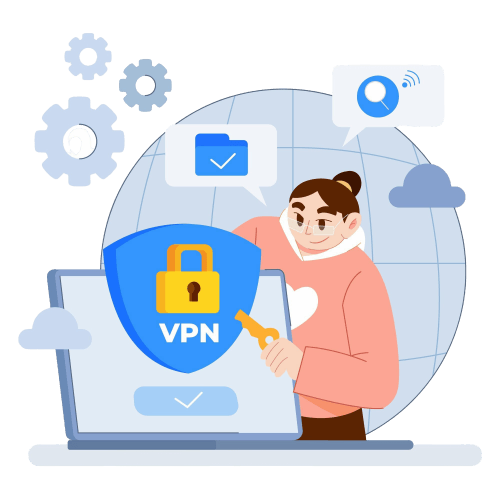In today’s digital age, privacy and security are paramount. Whether you want to access geo-restricted content, hide your IP address, or safeguard your online activities, VPNs (Virtual Private Networks) and proxies are popular solutions. While both serve similar purposes, they differ significantly in functionality, use cases, and the level of protection they offer. Lets delve into the key differences between VPNs and proxies to help you make an informed decision about which one best suits your needs.
Table of Contents
What is a Proxy?
A proxy serves as an intermediary between a user and the internet. It acts on behalf of the user, retrieving data from the web and sending it back. This concept can seem complex, yet it is fundamental in various online activities.
Types of Proxies
Proxies come in several types, each with its unique functionality. Here’s a quick overview of the most common types:
- HTTP Proxy: Designed specifically for web traffic, it can cache data for faster access.
- SOCKS Proxy: Works with any type of traffic, making it versatile for various online applications.
- Transparent Proxy: Passes requests without modifying them, often used for filtering content.

Common Use Cases for Proxies
Proxies are employed in diverse scenarios. Understanding these can illustrate their importance:
| Use Case | Description |
|---|---|
| Website Access Control | Organizations use proxies to restrict access to certain websites. |
| Anonymity | Users can browse the internet without revealing their IP address. |
| Data Scraping | Proxies help in collecting large amounts of data from websites without bans. |
What is a VPN?
A VPN, or Virtual Private Network, is a technology that allows users to create a secure connection to another network over the Internet. By doing so, VPNs ensure that users can browse privately and access information without the risk of being tracked or monitored.
How Does a VPN Work?
A VPN works by routing your device’s internet connection through a VPN server, hiding your IP address and encrypting your data. This process involves the following steps:
- Establishing a connection to the VPN server
- Encrypting your data for security
- Masking your real IP address

Types of VPNs
There are several types of VPN, each suited for different needs. Here are the most common:
| Type | Description |
|---|---|
| Remote Access VPN | Allows individual users to connect to a private network from remote locations. |
| Site-to-Site VPN | Connects entire networks to each other, useful for businesses with multiple locations. |
| Personal VPN | Aimed at individual users for secure browsing and hiding their online activities. |
Common Use Cases for VPNs
The versatility of VPN allows them to be used in various scenarios:
- Secure public Wi-Fi access
- Bypassing geographic restrictions on content
- Enhancing privacy and anonymity online
Key Differences Between VPNs and Proxies
Maintaining online privacy and security has become paramount. Two popular tools for this purpose are VPNs and proxies. While they may seem similar, they offer distinct features suited for various needs. Let’s explore the key differences between them.
Privacy and Encryption Levels
A significant distinction lies in their ability to ensure privacy. VPNs provide robust encryption, which secures all internet traffic. In contrast, proxies merely redirect your internet requests without any encryption, exposing users to potential risks.
Speed and Performance
When it comes to performance, both VPNs and proxies can affect your internet speed. However, VPNs often offer consistent speed due to encrypted connections designed to maintain efficiency. Conversely, proxies can sometimes provide faster access to resources, but without the security benefits.
Anonymity and IP Masking
Both tools offer some level of anonymity, but VPNs excel in this aspect. By masking your IP address, VPNs make it difficult for websites and ISPs to track your online activity. Proxies also mask your IP, yet they do so only for specific applications, which may leave other browsing sessions vulnerable.
Whether you choose a VPN or a proxy depends on your requirements. If you prioritize privacy and encryption, a VPN is the better option. If you need quick access without stringent protection, a proxy might suffice.
Advantages of Using a Proxy
A proxy server acts as an intermediary between your device and the internet. It forwards your requests to websites and returns the information to you, keeping your identity hidden. This setup offers numerous benefits.
Cost-Effectiveness of Proxies
Using a proxy can be a cost-efficient solution for various online activities. Here’s how:
- Reduced bandwidth consumption through caching.
- Lower operational costs due to increased efficiency.
- Affordable solutions compared to dedicated servers or VPNs.
Simplicity and Lightweight Operation
Proxies are designed for simplicity. They do not require complex configurations and can handle multiple tasks. For example:
| Proxy Type | Use Case |
|---|---|
| Web Scraping Proxy | Efficient data gathering from multiple websites. |
| Anonymous Proxy | Bypassing geographical restrictions. |
The lightweight nature of proxies allows for quick setup and usability. They fit seamlessly into various scenarios, such as:
- Web scraping – Collecting data without detection.
- Bypassing restrictions – Accessing geo-blocked content easily.
Utilizing a proxy can significantly enhance your online experience by providing a blend of cost-effectiveness, simplicity, and special functionalities. Integrating proxies into your internet usage can streamline processes and enable access to restricted information.
Advantages of Using a VPN
A Virtual Private Network (VPN) serves as a secure tunnel between your device and the internet. With increasing cyber threats, utilizing a VPN has become imperative for safeguarding personal data and accessing information freely.
Comprehensive Security and Encryption
One of the most significant advantages of using a VPN is its ability to provide comprehensive security through encryption. When you connect to the internet via a VPN, your data is encrypted, making it virtually unreadable to cybercriminals. This protects sensitive information such as:
- Banking details
- Password information
- Personal emails
Accessing Geo-Blocked Content
Another major benefit is the ability to bypass regional restrictions. Many streaming services, such as Netflix or Hulu, restrict content based on geographical locations. By using a VPN, you can:
- Change your IP address to appear in a different country.
- Access a wider range of content libraries.
- Enjoy streaming without geographical barriers.
Compatibility with Multiple Devices
VPNs are also highly compatible with various devices and platforms. Whether you are using a smartphone, tablet, or desktop, you can secure your online activities across:
- Windows
- Mac
- iOS and Android
Many VPN services offer applications tailored for each platform, ensuring you maintain strong security no matter how you access the internet.
Using a VPN not only enhances your online privacy through encryption but also provides unrestricted access to content while being compatible with multiple devices.
Limitations of Proxies
Proxies serve as intermediaries between a user and the internet, providing various functionalities such as anonymity and content access. However, despite their benefits, proxies also come with limitations that users should be aware of.
Key Limitations of Proxies
Let’s explore some major constraints associated with the use of proxies:
- Lack of Encryption: Most basic proxies do not offer encryption, making data vulnerable to interception.
- Security Vulnerabilities: Proxies can become targets for malicious users, exposing sensitive information.
- Limited Performance: Depending on the proxy server’s speed and load, users may experience slower connections.
- Scalability Issues: As user demand increases, many proxies struggle to maintain performance, leading to further delays.
Examples of Proxy Limitations
To illustrate the limitations further, consider the following table that summarizes these drawbacks:
| Limitation | Description |
|---|---|
| Lack of Encryption | Data sent through unencrypted proxies is susceptible to interception. |
| Security Vulnerabilities | Proxy servers can be configured poorly, leaving them open to security breaches. |
| Limited Performance | High traffic can lead to slow response times. |
| Scalability Issues | Proxies may not handle increased traffic efficiently, causing performance drops. |
Limitations of VPNs
Virtual Private Networks (VPNs) are widely used to enhance online privacy and secure internet connections. However, it is crucial to understand that they come with certain limitations that can affect your browsing experience.
Impact on Speed
One of the primary limitations of using a VPN is the potential decrease in internet speed. When you connect to a server, your data may take a longer route, leading to:
- Increased latency – slower response times for loading websites.
- Reduced bandwidth – limiting your ability to stream or download content.
For example, a user connecting to a server thousands of miles away may encounter significant delays.
Cost Considerations
While many VPN services offer free options, premium subscriptions often come with a cost. Users may face:
- Monthly fees that can add up over time.
- Hidden charges for additional features.
Investing in a VPN can be worthwhile, but users should be aware of potential expenses.
Trustworthiness of VPN Providers
Not all VPN providers are created equal; the level of trustworthiness can vary significantly. Some key factors to consider include:
- The company’s log policy – do they keep logs of user activity?
- Reputation based on user reviews and expert assessments.
For instance, a poorly rated VPN could jeopardize your privacy rather than protect it.
When to Choose a Proxy vs. a VPN
In the digital landscape, both proxies and VPNs serve as tools for enhancing online privacy and accessing restricted content. However, they function differently and suit various needs. Knowing when to choose one over the other is crucial for effective internet usage.
Key Use Cases
Below are specific scenarios that guide your choice between a proxy and a VPN:
- Accessing Geo-Restricted Content: If your primary goal is to bypass regional restrictions, a proxy might be sufficient. For instance, using a proxy to access streaming services like Netflix can be effective.
- Enhanced Privacy Needs: For users requiring a higher level of privacy, especially on public networks, a VPN is recommended. It encrypts your entire internet connection, providing a secure environment.
- Budget Constraints: Proxies often come at a lower cost than VPNs. If you’re on a tight budget and need basic access, a proxy may be the ideal choice.
Comparative Table of Proxy vs. VPN
Here’s a concise comparison to help you make your choice:
| Feature | Proxy | VPN |
|---|---|---|
| Cost | Lower | Higher |
| Privacy Level | Limited | High |
| Encryption | No | Yes |
| Speed | Faster | Slower (due to encryption) |
Security Concerns and Best Practices
In today’s digital world, security concerns are paramount. Whether you are using a VPN or a proxy, understanding the risks involved is crucial.
Common Risks Associated with Free VPNs and Proxies
Opting for free services might seem appealing, yet they come with significant risks:
- Data Logging: Free providers may log and sell your data.
- Malware: Some free VPN and proxy services may inject malware into your device.
- Lack of Encryption: Many do not provide adequate encryption, leaving your information exposed.
Best Practices for Safe VPN and Proxy Use
To minimize security concerns, consider these best practices:
| Practice | Description |
|---|---|
| Choose Reputable Providers | Always select a trusted and established vendor to ensure proper security protocols. |
| Combine Tools for Layered Security | Use VPNs in conjunction with antivirus software for enhanced protection. |
| Regularly Update Software | Keep your VPN and proxy software up-to-date to mitigate vulnerabilities. |
In Closing : Making the Right Choice
Choosing between a VPN and a proxy depends on your specific needs and priorities. If you’re looking for robust security, encryption, and the ability to safeguard your online activities comprehensively, a VPN is the better choice. On the other hand, if your needs are limited to bypassing minor restrictions or accessing content quickly, a proxy might suffice.
FAQs
What is the main difference between a VPN and a proxy?
A VPN encrypts all your internet traffic and routes it through a secure server, while a proxy only redirects specific traffic and doesn’t provide encryption.
Which is better for online privacy, a VPN or a proxy?
A VPN is better for privacy as it encrypts your data, while a proxy only hides your IP address without securing your information.
Can I use both a VPN and a proxy together?
Yes, you can, but it’s usually unnecessary. A VPN already provides more comprehensive security and privacy.
Are free VPNs and proxies safe to use?
Free options often come with limitations and risks, such as data tracking or slower speeds. It’s safer to choose a reputable paid service.
Will using a VPN or proxy slow down my internet?
Both can impact speed, but VPNs, especially high-quality ones, tend to maintain better performance compared to proxies.
Do proxies work on all devices?
Proxies generally work on specific apps or browsers, while VPNs can protect all devices connected to your network.
When should I use a proxy instead of a VPN?
Use a proxy for simple tasks like bypassing geo-restrictions for streaming or accessing blocked websites, but choose a VPN for complete security.
Is it legal to use a VPN or a proxy?
Yes, using VPNs and proxies is legal in most countries, but how you use them (e.g., for illegal activities) might not be.






